Peter MALONE
Agatha Christie's Poirot After the Funeral
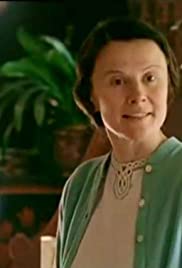
AFTER THE FUNERAL
UK, 2006, 93 minutes, Colour.
David Suchet, Robert Bathurst, John Carson, Anna Calder- Marshall, Michael Fassbender, Fiona Glascott, Geraldine James, Julian Ovenden, Lucy Punch, William Russell, Monica Dolan.
Directed by Maurice Phillips.
After the Funeral is an effective version of an Agatha Christie novel, one of the series on the television collection, with David Suchet as Poirot.
At first, there are not suspicions of the murder, the man who died known to be ill. However, when all the family gathers and there is the hearing of the will, there is a strong surprise, the presumptive heir being cut out of the will completely, the rest of the family inheriting instead. At the funeral, the dead man’s eccentric sister, whom no one has seen for 20 years, asks whether he was murdered.
The solicitor is puzzled and invokes the help of Poirot. He studies all the potential suspects, interrogations, visits.
The film has a very strong cast, David Suchet always excellent as Poirot, with Geraldine James as the anchor character in the house, an early film from Michael Fassbender as the heir, Lucy Punch as the missionary, and Anna Calder- Marshall as the wife of the dead man’s alienated brother. However, Monica Dolan steals the show with a dual performance.
There are great complications, especially dealing with art, paintings, greed and murder.
1. The popularity of Agatha Christie mysteries? Television series? David Suchet as Poirot?
2. The situation, the death, the funeral, the family assembled? The reading of the will? The surprises?
3. The British countryside, wealthy homes and grounds? The visit to the North? The musical score?
4. Poirot, the solicitor, the discussion on the train, observations of the family? Cora and the issue of whether Richard Abernathie was murdered?
5. Abernathie himself, his status, wealth, his family, his hostility towards his brother, Timothy? Timothy and Maud? George as the presumptive heir? The changing of the will?
Everybody else inheriting? Motivations?
6. Helen, her care for Richard, her character, at home, her love for George, relationship with Susanna, Rosamund and Michael? Possible motives?
7. George, his personality and character, the heir, his being ousted? His reactions, sullen manner, drinking? His visit to the North? The revelation of his relationship with Susanna? Their night together? George and his response? Susanna and her response? Guilt?
8. Susanna, devout, the African missions, the church, proper, her place in the family, relationships? The visit of the North? The revelation of her relationship with George? The consequences?
9. Timothy, cantankerous, hypochondriac, his relationship with Maude, bossing her about? His greed? Setting up the fake situation? In the wheelchair?
10. Rosamond, the theatre, her marriage to Michael, Poirot and his visit to the theatre, the discussions about production, ambitions, finance? Deception? Michael and his affair?
11. The images of nuns throughout the films? The theatre? In the town?
12. Cora, nobody seeing her for 20 years, her eccentricities, her eccentric behaviour at the funeral, suggesting that Richard was murdered? At home, her husband, the artist? Miss Gilchrist as a companion? After the funeral, her being found dead and battered? Her own paintings, the dating of the paintings? Poirot bringing in her husband as the art expert? The inconsistencies in the paintings of the dates, chorus and paintings?
13. Miss Gilchrist, mousy, demure, as a companion, her comments on Cora? The impact of the murder? The art, her paintings? The visits of the relations? The Rembrandt?
14. Everybody assembled, the revelation? Miss Gilchrist, the changing character, her impersonation of Cora, the true nature emerging, the angers, feeling deprived, the plan, the paintings, wealth?
15. The plot as an example of the least suspicious person being the murderer?
Man with Two Lives, The
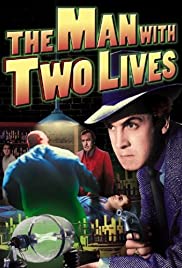
THE MAN WITH TWO LIVES
US, 1942, 64 minutes, Black-and-white.
Edward Norris, Marlo Dwyer, Eleanor Lawson, Frederick Burton, Addison Richards, Edward Keane, Hugh Sothern, Tom Seidl, Anthony Warde.
Directed by Phil Rosen.
This is a B-budget supporting feature. It capitalises on audience interest in medical experimentation, this time in the possibility of resuscitating the heart of a dead man. There are discussions between a medical doctor and the emphasis on signs and rigorous evidence and a psychologist who talks about the soul. There are discussions about the morality of this kind of experimentation.
In this way, the plot draws on the Frankenstein story, the experimenting, wanting to make new life, and creating some kind of monster.
After everybody is gathered for the celebration of an engagement, the fiance, Philip, played by Edward Norris, is involved in a car crash. The decision is made, especially with the urging of the dead man’s father, to try an experiment. In the meantime, there has also been some discussion about the transmigration of souls, as well as, at about a vicious criminal to be executed at midnight.
Needless to say, the resuscitation takes place at midnight with the result that the criminal’s soul inhabits the dead man. Rather quickly, the criminal assumes the leadership of the gang and its robberies, flirting with the dead man’s girlfriend. Since the running time is very short, the leadership of the gang is quickly established, the double life of Philip, his fiancee and friends very much concerned. There are some murders, especially as members of the gang and his girlfriend become aware of his respectable identity.
An informer gives the police information about a robbery. There is a raid, Phillip returning to his respectable home, the detective arriving, the confrontation, Phillip being shot – but, this is 1942, and there is a happy ending as he revives and his true soul trains migrates back home.
The director is Phil Rosen, who worked with Edison in filming The Miracle Man in 1912, began direction in 1915, prolific in small-budget features, his career cut short by his death in 1951.
Agatha Christie's Poirot Cards on the Table
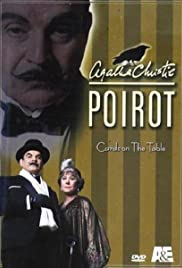
CARDS ON THE TABLE
UK, 2007, 103 minutes, Colour.
David Suchet, Zoe Wanamaker, David Westhead, Robert Pugh, Alex Jennings, Alexandre Siddig, Tristan Gemmill Honeysuckle Weeks., Lucy Lieman, Lesley Manville, Lindsay Marshall, Jenny Ogilvy, Douglas Reith,
Directed by Sarah Harding.
In Cards on the Table, the number of suspects is limited to 4 – although another is suggested. This means that the solution is not so surprising, one out of four. However, it is the motivations that make the difference as Well Is a postscript concerning the Superintendent.
At the centre is a mysterious Syrian millionaire with art interests. His played by Alexandre Siddig. At an exhibition, where Poirot and Mrs Ariadne Oliver, Zoe Wanamaker, who is to appear in other versions of Poirot novels, Shaitana, Arabic for Satan, discusses his trophies with Poirot, saying that he can outwit the detective, and have trophies of those who have killed without being caught.
The main action takes place at his home, four suspects of murder invited, Poirot and Mrs Oliver, a Colonel and the Superintendent from Scotland Yard. Shaitana is killed mysteriously.
Most of the action of the film then involves the interrogation of the suspects, flashbacks to the killings that they were involved in, investigations from the detectives and police, the gathering of all the suspects together and the unmasking of the murderer – not entirely surprising because of the limited number of suspects. However, homosexuality motivation is quite unexpected – as is the suggestion, the end, that the Superintendent has been involved with questionable behaviour and photographs.
The film has a strong cast including Zoe Wanamaker but also such veterans of British screen and stage, Alex Jennings and Lesley Manville.
The blame for the changes in the adaptation his sheeted home by the critics to the writer, Nick Dear.
1. The popularity of Agatha Christie mysteries? The television series? David Suchet as Poirot?
2. The adverse criticism of this episode? The plot alterations from the original novel? Behaviour of characters change, characters surviving not murdered? The most significant criticisms concerning the motivations of homosexuality, the behaviour of Dr Roberts, his relationships, the photographer and his camp behaviour? The intimations of homosexual behaviour by Superintendent Wheeler?
3. The London setting, the gallery, Shaitana’s home, décor? The flashbacks to the murders? The Amazon, Egypt, the home in the country? The musical score?
4. Poirot at the gallery, discussing sculptures with Mrs Oliver? Mrs Oliver and her later appearances in Poirot stories? Her flamboyant manner, dress, cigarettes? Manner of speech? Her novels, her detective and his style? Her investigations, misinterpreting the leads?
5. The introduction to Shaitana, his Syrian background, his wealth, the gallery? Look, sinister presence? Discussion with Poirot, his trophies, murderers undetected?
6. The guests, the dinner, Shaitana presiding, taunting the guests, indicating murders, secrecy? The challenge? Shooting, knives, poison?
7. The bridge games, the four suspects at the table, the detectives, writers and police at the other? The progress of the games? Shaitana and his presence? Eventually in the chair, asleep, dead?
8. The explanations of the four characters, the flashbacks to the killings? Those guilty, those not? The doctor, his practice, self-assurance, ladies man’, Mrs Craddock, the consultations, the affair, her going to Egypt, death from septicaemia? The doctor and his relationship with Miss Burgess in the office? Major Despard, an action character, time in the Amazon, the attraction to Miss Meredith, the background story, the drug crazed man, shooting him? Miss Meredith, her work for the elderly lady, the silver polish, her death? Mrs Lorimer, her secret about her daughter, pushing her husband down the stairs, her second marriage and the husband dying after a year? The reaction to being invited to the meal?
9. The four other players and the law, Poirot and his presence? Mrs Oliver? Hughes and his military background? Superintendent Wheeler, family man?
10. The range of interrogations, the suspects asked to describe the details of the room, the doctor accurate, Miss Meredith selective, the others not noticing much?, Mrs Oliver, her asking to be present at the questioning? The response of the others?
11. The various visits, Poirot to the doctor’s surgery, the encounter with Miss Burgess? Mrs Oliver, the friendship with the two young women? The interviews with Despard? Poirot and Mrs Lorimer?
12. The questions about Shaitana? The drugging? Drugging himself and self-confidence? A strange high? The murder planned or spontaneous? The stiletto? Poirot and his accusation of the Superintendent? Mrs Lorimer’s confession to save her daughter? Miss Meredith and Rhoda, the long friendship from school, living together, the lesbian intimations? On the lake, Rhoda attempting to kill her friend, the Major and his rescue?
13. The solution, not so surprising, that as it had to be one of the four? The eliminations? The doctor, his homosexuality, the photographs, the camp photographer and his models? The doctor and his affair? Spontaneously killing Shaitana?
14. Poirot accusing the Superintendent, envisaging his murdering? The photos – and the Superintendent and his compromising behaviour?
15. As an adaptation of the novel? And taking into account the criticisms of the numerous changes, as well as the introduction of the sexuality themes?
Long Way North/ Tout en haut du monde
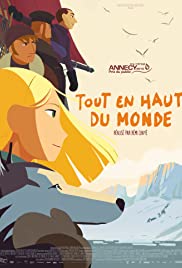
LONG WAY NORTH/ TOUT EN HAUT DU MONDE
France, France, 2015, 81 minutes, Colour.
Voices of: Christopher Ret, Fyodor Atkine, Peter Hudson, Tom Morton.
Directed by Remy Chaye.
This is an international animation film, from France working with Denmark, Belgium and the US. The animation is hand-drawn, bright and beautiful colours, attractive landscapes in Russia and in the Arctic, as well as showing the voyage of the ship and its being caught in the ice.
The setting is St Petersburg, 1882, a young woman with the world before her, is more interested in going to the North, in admiration for her grandfather, an explorer who has disappeared. She makes contact with boats from the North, seems assured of a passage to follow her grandfather’s route, but is deceived by some callous sailors. However, she perseveres, is allowed on board and sets sail.
There is some strong action as she goes through the Arctic snows, the dangers, discoveries, finding out what happened to her grandfather.
This is a film which can interest and entertain adults and younger audiences alike.
1. The title? Travel to the North Pole? Expeditions? Dangers? The 19th century?
2. A French production, English and dubbing? The animation style, the drawing, the characters, the landscapes? The voices, the musical score?
3. The Russian setting, 1882, the czarist era, wealthy families, homes and mansions? Government offices and officials? Ships, icebreakers, snow and weather, the ice, the mountains?
4. The grandfather, his statue and image, his ambitions, his inventions, the ship, going to the North Pole, planting the Russian flag? His bond with his granddaughter? Her admiration, wanting to follow his journey? Having his documents, the plan, the routes for the journey?
5. The setting, social life, parties and dinners, the new minister, his hostility, wanting the grandfather’s reputation removed? His planning? Confrontation of the family, the father and mother, his walking out of the dinner?
6. Sasha, her age, upset, getting the documents, deciding to leave home? Her initial travels, her inexperience, her pampered life, her treatment of people’s servants?
7. Going to the ship, the encounter with the young man, his promises, the money? Her returning to the hotel, the discussions, the ship sailing, her regrets? Losing her money, studying, working at the hotel, the kindly woman, her working heartily at prospering?
8. The return of the icebreaker, the Captain, the story, reprimanding his brother? The invitation to find the grandfather? The government reward money? The captain, reluctance, changing his mind, setting sail? The route followed? Sasha and her offering the alternate?
9. The details of the voyage, sailing, weather, her going up the mast, the ice, trapped? The response of the sailors?
10. The decision to go on land, the captain and his injury, his being carried, telling them to go ahead, his brother, leadership, the mountains and the difficulties?
11. The sighting of the ship, going to the ship, the grandfather, frozen?
12. The achievement? Its place in Russian history? Portrait of a heroic young girl?
Private Life/ 2018
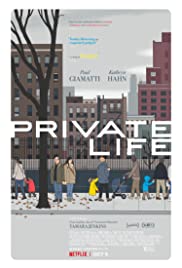
PRIVATE LIFE
US, 2018, 123 minutes, Colour.
Paul Giamatti, Kathryn Hahn, Kayli Carter, Denis O' Hare, Molly Shannon, John Carroll Lynch.
Directed by Tamara Jenkins.
The title does not quite do justice to the themes of the film. It is a film about a middle-aged couple and their desire to have a child, by means of in vitro or of adoption. The couple are played, with strong performances, by the ever-reliable Paul Giamatti and Kathryn Hahn, moving away from her frequent roles in broad comedy.
Various attempts to conceive have failed. A meeting with a prospective mother whose baby they might adopt comes to nothing. They have a sympathetic extended family, with in-laws played by Molly Shannon and John Carroll Lynch. Their daughter, who wants to be a writer, comes to stay with them, even offering to become a surrogate mother for them but she makes a number of mistakes and fails them.
So, this is a portrait of a loving couple, years of marriage, tensions between them, tensions aggravated and their having to come to some kind of decision, especially after the failure of help from their niece.
A topical drama enabling audiences to have some kind of understanding of an empathy for these parents who want to have a child.
1. The title, the tone? Ordinary people?
2. New York city, homes, fertility centres, hospitals? The world of doctors, therapists? Interstate, homes, outings? The writer’s mansion? The musical score?
3. Richard and Rachel, their story, the long marriage, their respective careers, age, their relatives, visits, the Thanksgiving dinner?
4. Fertility issues, audiences identifying with them, from the male point of view, significantly from the female point of view? Richard, the issue of testicles, sperm? Rachel, the ovaries? The history of attempts? Acknowledging the problems, issues of adoption, interviews and discussions with people and experience, the contacts, the young woman on Skype, going to Little Rock, her not showing? Issues of IVF, the interviews, Dr Dordek, his advice, their considerations, Richard and the attempt for sperm, the failure? His response? Rachel's reaction? Further information, possibilities, the costs, getting the $10,000? The continued experiments, the bond between the two, the tensions?
5. Richard, at 47, his phlegmatic character, his theatre career, the situation and his being partially resigned, the love for Rachel, their scenes together, Rachel and her moods, her priorities, the failures, checking the Internet for possible surrogate mothers? Evaluating them? The consequences?
6. Sadie, her life, her relationship with Cynthia, with her father, her sister, the phone calls, failures, extended exams? Her wanting to be a writer, her mother’s disapproval? Going to New York, the bond with Richard and Rachel, the visit, the idea of offering the surrogacy to her, her thinking it over, the tests, the procedures?
7. Sadie, sharing with Richard and Rachel, their care for her? The details of her living with them?
8. The Thanksgiving dinner, giving thanks, Cynthia, Sadie and her speech, Richard and Rachel and hesitations, the reactions, Cynthia and her outbursts, their leaving? The brother reassuring the money? Cynthia, menopausal behaviour, reactions? The other daughter, the joyful news of her getting into college?
9. The aftermath, Sadie and her attraction to the neighbour, going out on the date, the promise of no sexual encounter, her being late for the appointment, Rachel's reaction? The discovery that Sadie had taken the extra dose, not wanting to fail? Failure, her despair? Richard and Rachel and the reactions, response?
10. Going back to basics, more issues of adoption, the couple being resigned? Wanting children, at their age, the success and failures in their careers, Richard in the theatre, Rachel and the publication of her book at her outburst against the cover?
11. Going to the writer's mansion, Sadie enrolled, the lavish room, her gratitude?
12. Going back to adoption, going to the cafe, waiting for the prospective mother, an appropriate ending for the film?
13. Contemporary issues, fertility, marriage, family and children? Moral issues? Morale issues?
Runaway Milliionnaires
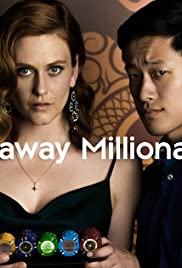
RUNAWAY MILLIONAIRES
New Zealand, 2018, 90 minutes, Colour.
Jess Sayer, George Zhao, Chloe White, Sam Wang, Pip Hall.
Directed by Pip Hall.
This New Zealand film is based on a true story. Kara and Leo, Leo of Chinese background, live in New Zealand, want to build a business at a service station and take out a loan. So far, so ordinary.
However, the bank makes a considerable mistake in its accounting, with $10 million made available. What is the couple to do? The film follows Leo, returning to China, caught up in gambling. Kara is a bit more cautious, getting help from her sister, in contact with her mother. She discovers she is pregnant. And she also gets a job dubbing films. And the strong temptation to keep the money.
The police are investigating, from New Zealand, the local police – and Kara, especially, having to face the truth and the consequences.
The impact of the film relies on audiences identifying if not with the characters, then with the situation, and how they might react were they to suddenly have $10 million at their disposal.
1. Based on a true story? A New Zealand story?
2. The title, the tone, emphasis on money, the consequences, escape, schemes, schemes collapsing?
3. The New Zealand settings, home, family, relatives? The service station? Hopes?
4. The Chinese settings, hotels, cities, homes and apartments, banks, workplaces, the dubbing studio? Airports, police, customs? The musical score?
5. Kara and Leo, life together, the plans for the service station, the issues of the loan? Their love for Lina? Hope for the future?
6. The mistake in the account, the extra $10 million? Leo’s response? The discussions, the cover up, the decision to keep the money? The decision to go outside the country? Leo and the Chinese connections?
7. Leo, the effect of the money, the various transactions, the hiding of the money in different countries? The gambling? The alienation from Kara and Lina?
8. Kara, her decisions, the money, not knowing all the facts, the gambling, keeping the chips for an emergency? With Lina and protecting her? Her continued contacts with her sister and her mother, their knowing something of the truth, their concern? Her depending on them?
9. Accommodation, having to move, Leo and the Chinese connections, hospitality, surviving, moving out? Hiding? Kara and getting the job with the dubbing, the sympathetic manager?
10. The discovery that she was pregnant, keeping secrets, admitting it to the friend at the studio? Leo and his return, concern? The decision for her to go to Hong Kong for a check – and her being caught by customs?
11. The New Zealand police, the visits, the interviews, the promises, the phone contacts, his persuasion?
12. The difficulties with the pregnancy, giving birth? The decision to return home, the preparations, her arrival? Her future?
13. The moral of the story – and Kara at the end wondering whether she would do it all over again or not?
Chernobyl

CHERNOBYL
US/UK, 2019, 230 minutes, Colour.
Jared Harris, Stellan Skarsgaard, Emily Watson, Jessie Buckley, Adam Nagaitis, Paul Ritter, Robert Emms, Sam Troughton, Adrian Rawlins, Con O' Neill, David Densik, Donald Sumpter, Jaime Sivas, Ron Cook, Barry Keoghan.
Directed by Johan Renck.
This is an award-winning BBC television miniseries. It won many awards including Golden Globes.
Ukraine and Chernobyl and its surroundings, 1986, are expertly re-created, especially the nuclear power plant, exterior and interiors. It shows the workings of the plant, its inadequacies, the first signs of difficulty, the spread, the ultimate disaster and lockdown. And, great attention is given to the technical attempts to extinguish the fire, to seal the plant.
In hindsight, audiences know that this was nearing the end of the Soviet Empire. Mikael Gorbachev was in his early years as General Secretary. Secrecy was important to the rulers of the politburo as well as to minor officials. The film explores this theme in great detail, the inadequacies of so many of the personnel involved in the disaster as well is the attempts to cover up.
The film has a very strong cast, with Stellan Skarsgaard as the official who ultimately has to pursue the investigation and make decisions. Jared Harris and Emily Watson are the investigating scientists who contribute the data – but are always under suspicion. There is very strong supporting cast, a great number of British character actors.
The film has many grim moments visualised quite strikingly. It is a reminder that a disaster has happened, the immediate consequences on workers and their families, on managers, on government officials, contributing a step to the opening up of the Soviet Union and its final collapse.
1. Audience knowledge of the place and events, 1986? Memories of survivors? Alert to further nuclear disasters?
2. The presentation of the facts, nuclear power, the atmosphere of the Cold War, the Soviet Union, Soviet supremacy, secrecy? Mikhail Gorbachev as General Secretary? His comment about Chernobyl and the fall of the Soviet Union?
3. Investigations, dossiers, conference in Vienna, the Russian trial, the emergence of the truth?
4. The impact of the miniseries, it’s many awards?
5. The opening, Legasov, the tapes, hiding them? The later revelation?
6. The events, the time indications, the tension? The reconstruction at the end during the course of Legasov’s testimony?
7. The reactor, previous tests, failures, secrecy? The reactor and the personnel, experience, lack of experience, young workers? Issues of responsibility, issues of power and promotions? The audience seeing the facts, the consequences, the explosion, the heat, the water, the flooding, radioactivity, the hasty meetings, the discussions, the move to cover up, refusal to accept responsibility?
8. The effects, on the staff, the confusion, decisions, the demands of Dyatlov? Imperious in manner? The calling in of the fireman and their exposure? The night, the dawn, the observers gathering? The dangers?
9. The immediate aftermath, the ministers meeting, Boris as minister responsible, Soviet loyalties, the cover-up? The calling in of Legasov, his responsibilities, expertise, understanding? The consultation, the meetings, Gorbachev, sending both to Chernobyl? Their observing, the interviews, the nature of the crisis at the decisions?
10. Authorities trying to reassure the public, television news, confined to the Soviet Union, the international awareness? Issues of evacuation or not, the perimeters, to contain the radioactivity? Its effect on people?
11. Legasov as a character, scientist, his qualifications, personality, concern, his contribution, the initial clashes with Boris, their working together, the development of the relationship? More information? The risks of their being infected by radioactivity? Boris and his change, his angers, dealing with the authorities, at meetings?
12. Ulana, her work, in Minsk, her knowledge, offer to help, some and, her arrival, her manner, the conducting the interviews, in the hospital’s, getting the information? The pregnant wife, her story, her wanting to be with her husband? The dying officials and engineers, her questions, compiling the dossier?
13. The personal focus, the fireman and his wife, not concerned initially, going to the fire, the radiation, the severity, in hospital? His wife’s pregnancy, her demanding attitudes, in the hospital, breaking the quarantining? His death? The pregnancy, the birth and the death of the child?
14. The range of activities in the aftermath, the testing of the robots to remove the graphite from the roof, their failing? The human effort, the men going onto the roof, protective clothing, short time exposed to radioactivity?
15. The issue of the fire, the helicopters, the crash, the blowing of the wind, the heat?
16. The three volunteers, the patriotic speech, protective clothing, going down under the floor, wading through the water, opening the doors, enabling the water to be sluiced out?
17. The miners, the talk, their arrival, the leader, the task, the difficulties, the time limit, round-the-clock, the huge effort, the heat, working naked, accomplishing their task?
18. The plan for covering the facility? Taking time? The final images of the covering of Chernobyl?
19. The scorched earth policy, the land, the squad shooting all the animals, the reactions for them? The old woman and her refusing to move, her death?
20. Time passing, the effects, the increasing number of cancers, Boris and Legasov and the information about their deaths?
21. The conference of Vienna, Legasov covering up, challenged by Ulana, the trial, the accused, the epilogue and his denials? Ulana and her persuasiveness? The recounting of the time, the accident, the scientific background, the reasons? Lucas of telling the truth? Boris intervening that everything should be out in the open?
22. The aftermath, the detailed information about the accident, the consequences, illness, the dangers to Europe, with the wind, acid rain, the cancers, the population-free area
around Chernobyl to the present?
23. The effectiveness of a miniseries to recapture events and atmosphere communicate these in later generations?
Agatha Christie's Poirot Hollow
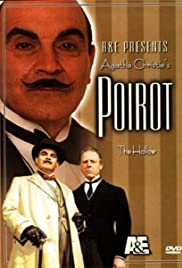
THE HOLLOW
UK, 2004, 103 minutes, Colour.
David Suchet, Jonathan Cake, Megan Dodds, Sarah Miles, Edward Fox, Claire Price, Lysette Anthony, Tom Georgeson, Edward Hardwicke, Caroline Martin, Jamie De Courcey.
Directed by Simon Langton.
The Hollow is a typical Agatha Christie mystery, dramatised as part of the television series, featuring David Suchet as Poirot. He is on holidays in the British countryside near the home of Lord and Lady Ankattel whom he had known previously and helped in Baghdad. He accepts an invitation to dinner, meets all the central characters, returning in the morning to find that one is dead.
The audience has seen the dead man, a doctor with a strong reputation, married with family, but a philanderer, having an affair with a very successful and strong-minded artist. He is played by Jonathan Cake. She is played, expertly, by Megan Dodds. The hosts of the home are played by Edward Hardwicke, the solid English gentleman, and Sarah Miles, rather flighty in her manner and style. In a cameo, Edward Fox plays the Butler.
It is the philanderer who was killed – and most people have a motive for killing him. On the night of the dinner, the house was gatecrashed by a neighbour, a Hollywood actress played by Lysette Anthony, who had been in love with the doctor 12 years earlier but he had chosen his career over her. She wants to start the relationship again. He accompanies her home and has a passionate night with her. Meanwhile, his wife is very timid, put down, thinking she is ignorant.
While the doctor is dead, his wife is found with the gun in her hand beside his body. As always, Poirot does the investigation, a complication that the gun in the wife’s hand was not that used for the killing. One of the complications is that the artist is also protective of the wife despite the affair. Ultimately, the killer is revealed – reminding audiences that Agatha Christie so frequently has the least obvious suspect as the murderer.
1. The popularity of Agatha Christie mysteries? The television series? David Suchet as Poirot?
2. The setting, the British countryside, mansions, country parks, holiday homes? Interiors? The musical score?
3. The hollow, the tone, the house, the residents, the holidaymakers in the area?
4. The introduction to John Christow, his rendezvous with Henrietta? His being a doctor, his reputation, research, clients visiting, his assistant? His reputation? His relationship with Henrietta? Her sense of style, strong presence, her art?
5. Christow going home, his talk about Gerda, the audience seeing her, the meek wife, putting herself down, ignorant? Even to starting the car? Family?
6. Christow and Henrietta going for the weekend? Henrietta’s speedy driving and Poirot’s reaction? Gerda’s presence? Lord and Lady Angkattell, his being the country gentleman, courteous, the background history with Poirot in Baghdad, military, his collection of weapons? Hunting, even teaching Gerda to shoot? His wife, memories of Baghdad? The fussing in the house? The touch of the giddy?
7. Poirot, on holidays, the invitation to the house, his celebrity? His knowing his hosts in Baghdad and helping them? The dinner, everybody present, the tensions at the table?
8. Midge, related to the family, her infatuation with Christow? Edward, his infatuation with Henrietta?
9. The arrival of Lucy Crane, the style of the 30s actress, English background, Hollywood success, blonde and forward? Wanting matches? Imposing on the hosts? Meeting Christow? Revelation of the past liaison, her being in love, his making decision in favour of his career? 12 years? The separation? The return, wanting to continue the liaison? Gerda noticing Christow’s look? His accompanying her back to the cottage? The passionate night? His later return, Gerda awake?
10. The situation in the morning, Christow’s body by the pool, Gerda with the gun in her hand? The tableau of those watching? Poirot, his arrival, his suspicions?
11. The reconstruction of the situation? The revelation of motives? The positioning in the tableau? The gun in the pool, the recovery, its not being the gun of the murder? The host’s collection? The witness of the butler, his dignified presence, contribution to the solution?
12. Poirot and the discussions with Henrietta, her seductive style with him? Protecting Gerda – as seen throughout as caring for her? The issue of the gun? Poirot returning to her studio, the horse, finding the gun in the statue?
13. His return, everybody assembled? The possibility for each suspect? The revelation about Gerda, her manner, concealment, persuaded to tell the truth, her jealousy, the gun, shooting her husband, her plan with the alternate gun?
14. The satisfactory mystery? Interesting characterisations? And the guilty person being the least obvious?
Mystery Road TV 2
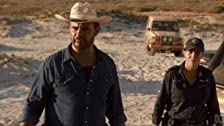
MYSTERY ROAD 2
Australia, 2020, six x 55 minutes, Colour.
Aaron Pedersen, Tasia Zalar, Tasma Walton, Jade Alberts, Callan Mulvey, Rob Collins, Gary Sweet, Ursula Yovich, Sophia Helin, Ngaire Pigram, Mark Richardson, Simon Lyndon, Rhimi Johnson, Keith Robinson, Ava Farrer, Stan Yarramunual.
Directed by Warwick Thornton, Wayne Blair.
The initial Mystery Road, the film version, was written and directed by distinguished aboriginal film-maker, Ivan Sen. It was a considerable box office success, very popular in Australia. It was also a showcase for actor, Aaron Pedersen, who portrayed the loner aboriginal Detective, Jay Swan. This led to a second feature film, Goldstone, again with Pedersen as Jay Swan, and with the supporting cast including David Wenham and Jacki Weaver.
In the wake of this popularity, a miniseries was written showcasing Jay Swan and his investigations in the outback. This time the supporting cast included Judy Davis and Colin Friels. It also filled in quite an amount of Swan’s background, especially concerning his wife and daughter. There were many social issues explored as well as the series having enough time to develop Swan’s character and his interactions.
Again the popularity led to a second television series. This time Aaron Pedersen’s Swan seems even more taciturn, loner, relentless in his pursuit of criminals, with the touch of relentless lack of finesse. He is invited into a town in north-western Australia (fine coastal scenery and hinterland), a story of murder, drug manufacture, drug dealings, business and police corruption. He works with the young aboriginal policewoman in the town. And his wife reappears. She is in a relationship with a former policeman, Callan Mulvey – with Swan suspicious.
There is a subplot concerning a Scandinavian archaeologist who is working on a site, with permission from the local aborigines, but causing protests from others. In her dealings, she discovers a skeleton – which leads to further investigations, conflicts in the aboriginal community, a complication with a local minister, and dramatic incidents concerning a trucking company, drug manufacturing, international flight deliveries.
The first television series was directed by Rachel Perkins. Three episodes each were directed by Wayne Blair and Warwick Thornton in this series, Warwick Thornton acting as of director of photography for all six. These miniseries remind audiences that Australia has three very talented aboriginal directors in Perkins, Thornton and Blair.
1. The Mystery Road series, the initial film, Goldstone, the two television series? The popularity? The Australian appeal? Aboriginal appeal? International impact
2. The cumulative effect of the film is a series? Over seven years?
3. The setting for this series, the town of Gideon, Western Australia, the coastal setting, the sea, the beaches? The town, homes, industry, the police officers, the hospital, perhaps? The musical score?
4. The opening with the murder mystery, the fishermen, the dead body, decapitated, the later discovery of the head? Autopsies? Investigations? Jay Swan coming in, his working with the locals, with Fr and have aboriginal background, with Owen, the veteran? The murder in the context of drugs, dealers, carriers, the network?
5. The personal stories, Jay and Mary, Fr and her sister Leone, their father, Amos and Pansy, the archaeologist, Jimmy 2 and aboriginal leadership, Simon and the possibility with Mary, his control?
6. Jake Swan’s personal story, the loner, long years as a detective, taciturn, intolerant? The marriage to Mary, her presence in the town, the hospital, with Simon? Their interactions? The history with their daughter? His sullen manner, his dedication and relentlessness? The past and his methods? With the locals, searching, arrests, not concerned about warrants? His working with friend, amend talk, his criticisms of and his laziness? His reactions to May and Simon, investigating Simon? His knowing Sherbourne and her daughter? Concern for her? Shooting, weapons, accurate on targets? The various encounters, with a trucking company boss, with Our key me and the defiance, Simon, the thugs coming in? The dangers?
7. Fran, her education, the contrast with Leone, demonstrations, defiance? Leone in the protests? Fran arresting her, in jail? The memories of Zoe and her disappearance? The discovery of the bones, at the church, the interrogations? Fran defying Owen, the USB stick and the surveillance tapes? Her taking a stance?
8. Mary, the past, their daughter, working at the hospital, the attraction to Simon, his visits, the date, her looking after Sherbourne and Ava, the date of the lavish house, her reaction, suspicions, leaving, taking refuge with Sherbourne at the hotel? The thugs coming in threatening? The shootouts?
9. Sherbourne, Ava, Mary minding the daughter, her going on the date with Philip, dancing, drugs, the sexual attraction, her challenging Philip, his reactions, using Sherbourne, willing to inform, the self-wounding and blaming Jay?
10. Simon, his presence in the town, past, ex-policeman, his record? Helping, taking Jay to the factory, shooting the boss, the discussions about a cover-up? Bringing marriage the house, lavish, cooking, the confrontation? Going to the hospital, her wounding his shoulder? His killing Alec Amy? The boss, the plane coming in, the fishermen and the boat, the delivery of the drugs? Jay and his pursuit? The confrontation?
11. The initial murder, the drugs in the mouth, the they had disappeared, the role of the fishermen, the identity of the victim, the visit to his wife, filling in the background?
12. Trucking, in Western Australia, the owner, the staff, the business, the factories and industry, the drug production? Jay confronting the owner, Simon shooting him?
13. The range of suspects, the people around the town, working for the trucking company, high on drugs, the various deaths?
14. The subplot of the archaeologist, coming from Scandinavia, the University, the story, leaving her partner, coming to Western Australia, the careful digging, the permits from the aboriginal community, Amos and his protection? Leone and the demonstrations against her? Finding the grindstone and its historical value? Discovering the bones, leaving them in the church? The promised to repatriate Leone’s mother is remains? The possibilities for her work, the discussions with the Minister, revealing aboriginal history to the aborigines? Her sense of faker?
15. Amos, his relationship with Pansy, with Jimmy 2, aboriginal leadership, traditions, rules? His relationship with Ursula? Relationship with Zoe, the young man, taking them to the bus stop? The return? The murders? The identification of the bones? Accusations of murder cover-up?
16. Harry, the Minister, in his wheelchair, the bones the church, Ursula and her presence, singing? The past with Zoe? The rumours? The funeral, the celebration? The discussion with the archaeologist?
17. A complex story of aborigines, white communities, drug exploitation? Police, detection?
Moonraker/ 1979
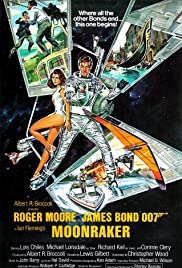
MOONRAKER
UK, 1979, 126 minutes, Colour.
Roger Moore, Lois Chiles, Michael Lonsdale, Richard Kiel, Corinne Clery, Bernard Lee, Geoffrey Keen, Desmond Llewellyn, Lois Maxwell, Toshiro Suga, Emily Bolton, Blanche Ravalec.
Directed by Lewis Gilbert.
This is the fourth James Bond film with Roger Moore as Bond. He was to make three more.
There are the usual conventions of the Bond films with Sean Connery and Moore. Roger Moore is very suave, has clipped British articulation, has all the manner of a gentleman. He also goes into ready action. He also has a way with women – which in later times seems a bit outdated.
In this film, he has a to visit California to see an entrepreneur, Drax, Michael Lonsdale, who is developing a space vehicle – and, in the opening, a prototype has been stolen and disappears in the air. Bond’s pursuit of Drax includes a lavish visit to Rio, a journey to the Amazon, sabotaging Drax’s plan to form a eugenics community in space and to poisoned the Earth.
The leading lady, a scientist, is played by Lois Chiles. Regulars Bernard Lee, Geoffrey Keen, Desmond Llewellyn, Lois Maxwell are all present. And, so popular in The Spy who Loved Me, Richard Kiel as Jaws makes a reappearance, initially sinister, ultimately friendly.
Directed Lewis Gilbert made a number of the James Bond franchise.
1. The continued popularity of the James Bond series? The conventions of the genre, the British hero and his style, 007, his relationship with M, Q and the supplies, the international issues, larger than life villains, the collaboration with women, the Bond girls?
2. The transition from Sean Connery to Roger Moore? His fourth episode? His particular style, sheesh, accent, articulation, perfect taste, action sequences, women? Solving problems in cases?
3. The opening, an action sequence, Bond in action, the plane, without a parachute, gliding towards the man with the parachute, pursued by Jaws? The crash into the marquee?
4. With M, with the Minister, with Q? The bureaucratic tradition? The opening with the plane, carrying the Moonraker, the spires, stealing the Moonraker, the crash of the plane? Bond being sent to meet with Drax? The British government and the embarrassment at losing the moon breaker?
5. The visit to California, Corinne and her accompaniment, the extensive plant, the French château in California, exteriors and interiors? The young people exercising – and the later revealing of the plan? Drax, playing the piano, French manner? Bond and his tour, Drax wanting to get rid of him, his Korean assistant? Bond and his meeting Holly Goodhead? Her manner, showing him around, the machine and the experiment, his getting in, the Korean taking over the management, the excessive speed, his using his equipment to stop the machine?
6. The evening with Corrine? Searching Drax’s desk, the papers? Corrine and her help, the safe? Her being expelled? Chased by the dogs into the forest?
7. Bond, the clue for Brazil, the extensive scenes in Rio, the clubs, the car pursuits, the plant on the mountain? Drax and his presence? The glass company, the fights and the destruction? Jaws and his presence?
8. The information about the Amazon, M and the Minister, the humiliation from Drax? Bond on his mission? The collaboration with Holly Goodhead? The plant, concealed, in the ruins, the plan for the space mission, the young people, a new civilisation, the poison gas to destroy earth?
9. The action sequences, the fights, Bond being taken, getting free, Holly Goodhead, the rescue, their working together?
10. The fights with Jaws, especially on the cable car on the mountain in Rio? Jaws, the young woman, small, falling in love? Humiliated by Drax? Changing sides?
11. The flight into space, the mission, the passengers, Bond getting free, Holly, the fights? The setting off of the capsules with the poison? The confrontation with Drax – and sending him into space?
12. Holly and Bond, pursuit of the capsules, eventually destroying them?
13. Back in London, the visuals, Bond with Holly – and the usual Bond ending?
14. The status in retrospect of this episode? Criticised at the time because of the space aspects which were not so popular?